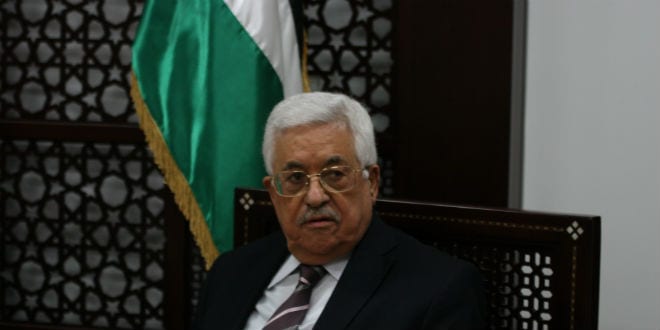The Palestinian Authority’s collapse is not contingent on Israeli actions or plans. The PA is collapsing on the ground, every day. In light of this state of affairs, Israel must consider its actions to ensure that its interests are secured.
The question of whether Israel should or shouldn’t dismantle the Palestinian Authority is the wrong question. The PA is collapsing on its own. The PA today no longer exerts control over the majority of the cities and villages located in Areas A and B in Judea and Samaria. These are the territories that Israel transferred to Palestinian control in the framework of the Oslo accords. They have functioned as self-ruled areas under PA control since 1996.
In recent months, Hamas terrorists in Judea and Samaria have expanded their terror operations against Israelis. Hamas’s stepped up operations are proof of the PA’s collapse. The PA rightly views Hamas as the greatest threat to its power. Its ability to operate even in areas, like Ramallah, the epicenter of the PA’s security and governing infrastructure is a testament to the PA’s weakness.
Beyond its flagging hold over territory it formally controls, the PA is in the midst of a leadership crisis. PA Chairman Mahmoud Abbas is both reviled and in failing health. Whereas when Yassir Arafat died in 2004, Abbas was his recognized successor, Abbas has no recognized heir.
There are two scenarios for a post-Abbas PA.
First, Hamas may grab the reins of power. Hamas’s recent terror attacks – including Sunday’s attack in Ariel – demonstrate that Hamas is positioning itself to oust Fatah from power. Hamas’s favored tactic for achieving this aim is to provoke Fatah’s terror forces to join its terror operations against Israel. As Palestinian expert, Lt. Col. (res.) Baruch Yedid notes, this was Hamas’s plan in 2014 when its terror forces kidnapped and murdered three Israeli youth in Gush Etzion and so set off the chain of events that led to Operation Protective Edge. Hamas’s rationale is that Fatah participation in terror against Israel will provoke the US and Israel to cut ties with Fatah. Without Israel and American protection, Hamas reasons, the PA will be unable to block Hamas from seizing power.
The second scenario is that rather than be recentralized under Hamas control, power in the Palestinian population centers will be diffused and decentralized. Rather than centrally governed, each town and village will be ruled by local leaders, operating with the legitimacy and power of powerful family groupings and local alliances.
With these two scenarios in mind, and in the face of the PA’s self-propelled implosion, the question Israel needs to broach is how to operate in this dynamic environment to secure its national and strategic interests in Judea and Samaria.
There are, to be sure, several practical actions Israel must take. But their success will be dependent on Israel first taking a strategic step. The first thing Israel must do in the face of the PA’s collapse is apply its law to Area C. Applying Israeli law to Area C — that is, the territory in Judea and Samaria that includes all of the Israeli communities and military installations, Israel’s eastern frontier along the Jordan River and its strategic defenses in the Samarian mountain range and the south Hebron hills is essential to ensure Israel’s perpetual control over the areas in Judea and Samaria that it requires to secure its strategic and national interests.
More than any other step Israel might take, applying its law to Area C will demonstrate to the Palestinians that they have no hope of using terror or political warfare to dislodge Israel from the area. In one fell swoop, Israel will restore the deterrent power it lost over the Palestinians when it embraced the PLO as a legitimate force and gave the terror group legitimacy, territory and weapons 26 years ago.
Beyond the impact the move will have on the Palestinians and their appetite for war with Israel, the move will free the IDF to defeat the Palestinian terror forces operating in Judea and Samaria. Since 1967, the IDF’s Central Command has been straddled with two missions – one military and one civilian. The civilian mission has been to govern the residents of Judea and Samaria through the military government and its civil administration. Since 1996, with the establishment of PA autonomy in Areas A and B, Central Command has been responsible for governing Area C. Since eighty percent of Area C residents are Israeli, the prolongation of the Civil Administration has enmeshed the IDF in civilian governance issues it has no expertise in, at the expense of its military readiness and focus.
By dissolving the military government and civil administration in Area C and transferring governing responsibility to civilian government ministries, the government will free the IDF to concentrate all of its energies on its core competency – fighting and defeating Israel’s enemies.
This then brings us to concrete actions Israel must take on the ground in Areas A and B in either post-PA scenario. Israel’s first goal should be to block Hamas from taking over the areas as it took over Gaza in 2007. Among other things, this will require the IDF to enter Areas A and B and seize as much weaponry as possible as quickly as possible.
The prospect of the PA being replaced by local bosses is a better outcome for Israel and in all likelihood, for the Palestinians as well. Still, under this more positive scenario, the IDF will be required to seize as much weaponry from Areas A and B as it can. But under this latter scenario, the Palestinian will to attack Israeli security forces and civilians will likely be reduced. Indeed, in at least some locales, empowered local leaders will seek out opportunities to cooperate with their Israeli neighbors in Area C.
Several commentators argue that the Hashemite Kingdom in Jordan has an interest in replacing the PA in Areas A and B. Israel, they insist should encourage such an outcome. But on the ground, there is no evidence that Jordan has any interest in governing the areas. To the contrary. The Hashemite Kingdom is in the grips of domestic protests challenging its legitimacy as never before. Throughout Jordan, demonstrations against the Hashemite monarchy have become routine. And even worse for the regime, the protests are not being led by the Palestinians or the Muslim Brotherhood or other traditionally hostile – and repressed — groups. They are being led by the Hashemites’ traditional supporters – Jordan’s Beduin tribes.
Under the circumstances, the last thing King Abdullah II is interested in is restoring his kingdom’s control over areas on the western side of the Jordan River. Such a move, which would increase still further the Palestinian majority in Jordan’s population would undermine the little stability his regime still enjoys.
In the absence of a helping hand from Jordan, it will fall to Israel – and Israel alone – to secure its long term national and strategic interests in Judea and Samaria.
Again, Israel has no need to expedite the process of dismantling the PA. But it also has no interest in slowing down the process.
Rather, Israel must concentrate on the parts of the story it controls. It needs to prepare for the anarchy barreling towards it in light of the PA’s collapse. Israel must remove as much weaponry as possible from Areas A and B. It needs to block Hamas from filling the leadership void the PA will leave in its wake. And it needs to prevent hostile foreign powers, including the EU from deploying civilian or military forces to the area.
To this end, Israel must dismantle the military government and civil administration in Area C to enable Central Command to focus its energies on defeating enemy forces. The government must use the civilian resources required to ensure the continuous supply of basic goods to Palestinian population centers to prevent the creation of a humanitarian crisis in Palestinian areas.
Taking these actions will go a long way to ensuring that whatever happens in Areas A and B, Israel’s long term strategic and national interests in Judea and Samaria – and the rest of the country – will be protected.






